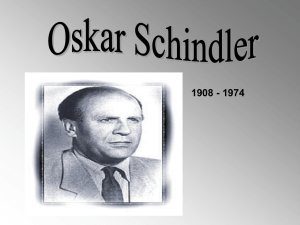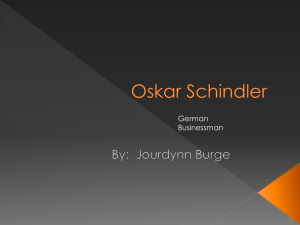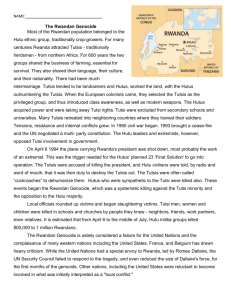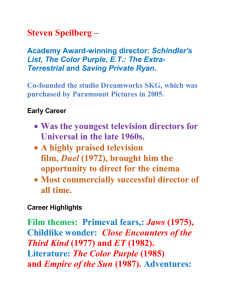Oscar Schindler 2 texts w prompt
advertisement
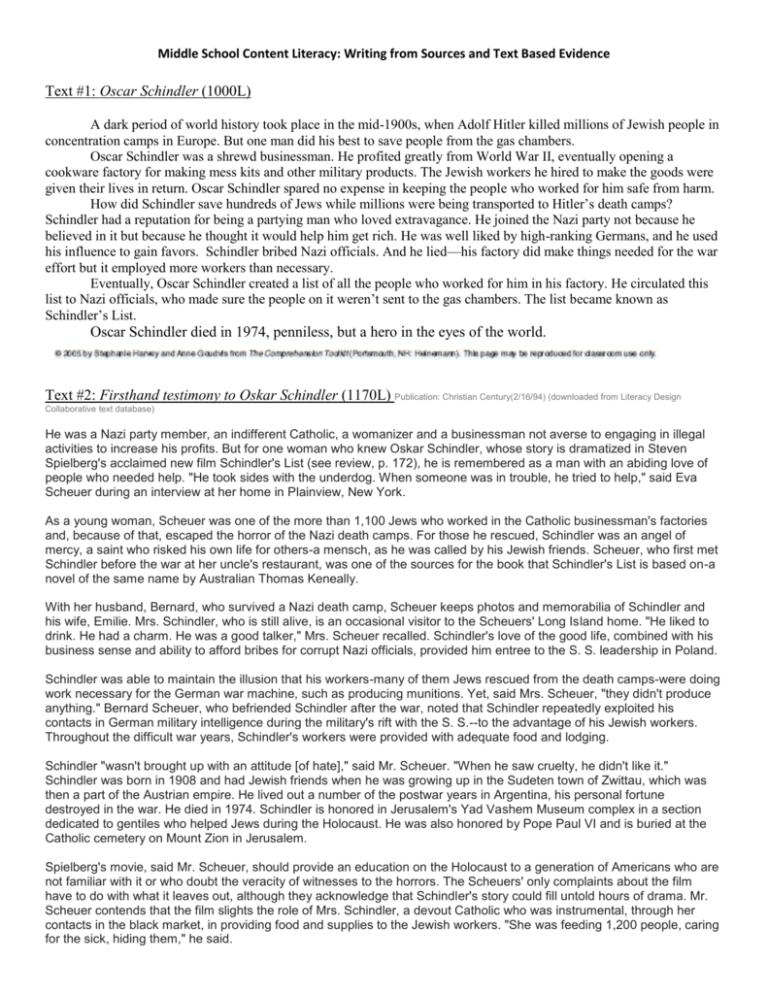
Middle School Content Literacy: Writing from Sources and Text Based Evidence Text #1: Oscar Schindler (1000L) A dark period of world history took place in the mid-1900s, when Adolf Hitler killed millions of Jewish people in concentration camps in Europe. But one man did his best to save people from the gas chambers. Oscar Schindler was a shrewd businessman. He profited greatly from World War II, eventually opening a cookware factory for making mess kits and other military products. The Jewish workers he hired to make the goods were given their lives in return. Oscar Schindler spared no expense in keeping the people who worked for him safe from harm. How did Schindler save hundreds of Jews while millions were being transported to Hitler’s death camps? Schindler had a reputation for being a partying man who loved extravagance. He joined the Nazi party not because he believed in it but because he thought it would help him get rich. He was well liked by high-ranking Germans, and he used his influence to gain favors. Schindler bribed Nazi officials. And he lied—his factory did make things needed for the war effort but it employed more workers than necessary. Eventually, Oscar Schindler created a list of all the people who worked for him in his factory. He circulated this list to Nazi officials, who made sure the people on it weren’t sent to the gas chambers. The list became known as Schindler’s List. Oscar Schindler died in 1974, penniless, but a hero in the eyes of the world. Text #2: Firsthand testimony to Oskar Schindler (1170L) Publication: Christian Century(2/16/94) (downloaded from Literacy Design Collaborative text database) He was a Nazi party member, an indifferent Catholic, a womanizer and a businessman not averse to engaging in illegal activities to increase his profits. But for one woman who knew Oskar Schindler, whose story is dramatized in Steven Spielberg's acclaimed new film Schindler's List (see review, p. 172), he is remembered as a man with an abiding love of people who needed help. "He took sides with the underdog. When someone was in trouble, he tried to help," said Eva Scheuer during an interview at her home in Plainview, New York. As a young woman, Scheuer was one of the more than 1,100 Jews who worked in the Catholic businessman's factories and, because of that, escaped the horror of the Nazi death camps. For those he rescued, Schindler was an angel of mercy, a saint who risked his own life for others-a mensch, as he was called by his Jewish friends. Scheuer, who first met Schindler before the war at her uncle's restaurant, was one of the sources for the book that Schindler's List is based on-a novel of the same name by Australian Thomas Keneally. With her husband, Bernard, who survived a Nazi death camp, Scheuer keeps photos and memorabilia of Schindler and his wife, Emilie. Mrs. Schindler, who is still alive, is an occasional visitor to the Scheuers' Long Island home. "He liked to drink. He had a charm. He was a good talker," Mrs. Scheuer recalled. Schindler's love of the good life, combined with his business sense and ability to afford bribes for corrupt Nazi officials, provided him entree to the S. S. leadership in Poland. Schindler was able to maintain the illusion that his workers-many of them Jews rescued from the death camps-were doing work necessary for the German war machine, such as producing munitions. Yet, said Mrs. Scheuer, "they didn't produce anything." Bernard Scheuer, who befriended Schindler after the war, noted that Schindler repeatedly exploited his contacts in German military intelligence during the military's rift with the S. S.--to the advantage of his Jewish workers. Throughout the difficult war years, Schindler's workers were provided with adequate food and lodging. Schindler "wasn't brought up with an attitude [of hate]," said Mr. Scheuer. "When he saw cruelty, he didn't like it." Schindler was born in 1908 and had Jewish friends when he was growing up in the Sudeten town of Zwittau, which was then a part of the Austrian empire. He lived out a number of the postwar years in Argentina, his personal fortune destroyed in the war. He died in 1974. Schindler is honored in Jerusalem's Yad Vashem Museum complex in a section dedicated to gentiles who helped Jews during the Holocaust. He was also honored by Pope Paul VI and is buried at the Catholic cemetery on Mount Zion in Jerusalem. Spielberg's movie, said Mr. Scheuer, should provide an education on the Holocaust to a generation of Americans who are not familiar with it or who doubt the veracity of witnesses to the horrors. The Scheuers' only complaints about the film have to do with what it leaves out, although they acknowledge that Schindler's story could fill untold hours of drama. Mr. Scheuer contends that the film slights the role of Mrs. Schindler, a devout Catholic who was instrumental, through her contacts in the black market, in providing food and supplies to the Jewish workers. "She was feeding 1,200 people, caring for the sick, hiding them," he said.

